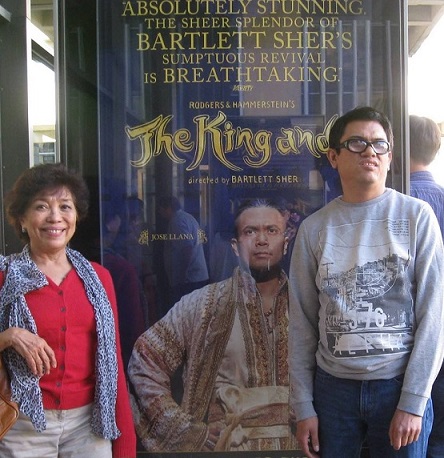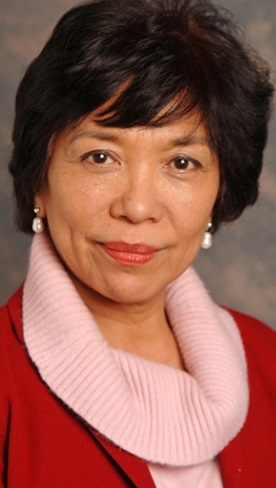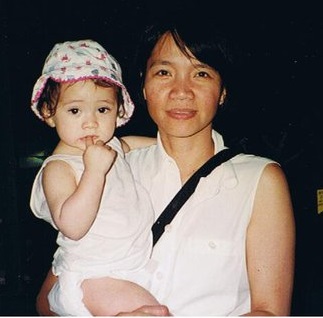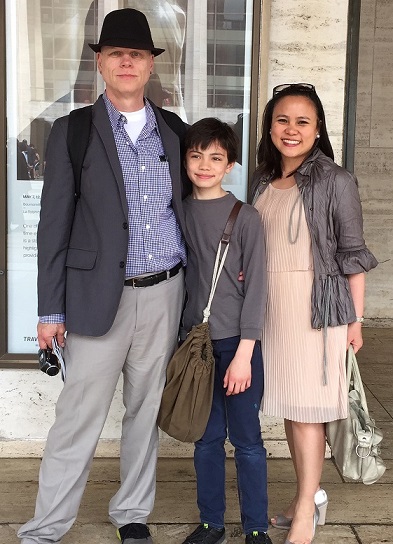![For FREE immigration consultation, CLICK HERE. Use Code: THE FILAM]()
For FREE immigration consultation, CLICK HERE. Use Code: THE FILAM
![red line]()
![Emil as seen by his father: ‘Strong-willed, with a firm sense of self.’]()
Emil as seen by his father: ‘Strong-willed, with a firm sense of self.’
By Tricia J. Capistrano
“Mama, can you please look at this and let me know if they’re correct?”
I read the words in pencil written by my 10-year-old son, Emil, on crumpled notebook paper.
dumb – walang imik
mean – ibig sabihin
stupid – hangal
I was surprised and then heartbroken. Emil did tell me that a friend suggested that he make a list of curse words in Tagalog. At that time, I didn’t know what it was for.
I was also surprised at how inaccurate the translations were. If Emil wanted to call a classmate dumb, you didn’t say, “walang imik,” which means quiet. I thought translation sites were much smarter.
Emil looked at me expectantly for a response so I told him to use “gago.”
“Can you teach me some more,” he asked. I didn’t reply. I thought long and hard before answering because I was not sure if teaching my son to curse more effectively in my native language was the right thing to do. It was certainly a decision I never imagined I would have to make as a parent.
I moved from Manila to New York in 1996 to go to graduate school at NYU. My parents, both Filipino, had studied in the U.S. for their masters’ degrees in the late ‘60s, and then gone back to Manila, started their own business, and raised a family. They saved up money so I too could go to grad school abroad; we all assumed that I would return to the Philippines.
Instead, I fell in love with an American grad student whom I had met at school, and we decided to marry and live in New York City.
After Emil was born, our primary reason for staying in Manhattan was his well-being. From the time he was old enough to express a preference, Emil chose toys and clothes for girls. Our neighbor down the hall had a Noah’s Ark play set, while all the other toddlers chose to play with Noah or the animals, Emil always sought out Naamah, Noah’s wife.
Raised in a bilingual home, Emil didn’t talk until he was 3. One of the first things he told us was that he was a “boy-girl.” As the months passed, his feminine behaviors persisted, so we saw a child psychiatrist who told us that for gender non-conforming children like Emil, there was a 75 percent chance that he would identify as gay, a 24 percent chance that he would be straight, and a 1 percent chance that he would identify as transgender.
![The author with husband Tony Kelso and their son Emil, who is 11 in this photo.]()
The author with husband Tony Kelso and their son Emil, who is 11 in this photo.
If such children are not accepted and supported by their families, we were told, they may face depression, even suicide. “What he needs most is a home where he knows he is loved and supported.”
Since New York City is one of the most diverse cities in the world, my husband and I thought Emil would be better off growing up in Manhattan than in Manila. In the Philippines, over 80 percent of the population is Catholic. Although gays and lesbians appear in talk shows and sitcoms, there is still a lot of discrimination against LGBTs. A friend said it will take generations before there are laws sanctioning non-traditional domestic partnerships.
When Emil was 3, we took him to a neighborhood dance party. While the other children bobbed up and down on the dance floor off and on, Emil bounced and twirled non-stop for almost 30 minutes.
The following year, we signed him up for ballet class. As he grew older, he was awarded scholarships at several ballet schools. Last December, he was chosen to perform a small part in New York City Ballet’s production of the Nutcracker in Lincoln Center. He was in 24 shows, some scheduled during school days.
My husband and I were so proud of him. We told all our friends and relatives. And because he had to be absent from school on some days, we also told Emil’s teachers. Those performances, I now suspect, were what led to the harassment. That, and the essay he wrote for his 5th grade English class.
For his essay, Emil chose to write about why marriage equality should be legal in all of the U.S. I was both scared and proud of him–scared because he was implicitly outing himself to his classmates, but proud, that at such a young age, he was so sure of himself.
Emil got a 3 out of a possible 4 for the essay– in the heat of composition, he forgot to include a bibliography. A week later, the mom of one of Emil’s best friends texted me that Emil got into a fight with one of the kids in his class and the boy had tried to choke him. She added that many of the boys in Emil’s class verbally abuse him but he usually ignores them.
My husband and I were surprised. Emil tells us about his day every night at dinner. He’s complained about his teachers who punish the class by taking away recess and about members of his reading group who don’t want to read but he never said anything to us about being bullied.
My husband wrote the principal and guidance counselor. But when the counselor met with Emil and the boy who tried to choke him, both children did not say a word.
![Fifteen-year-old Emil is a sophomore at the Professional Performing Arts School High School in NYC, and a gifted ballet dancer.]()
Fifteen-year-old Emil is a sophomore at the Professional Performing Arts School High School in NYC, and a gifted ballet dancer.
I was furious. I was angry with the other boy, but also with Emil and the counselor. I wanted the other child to be suspended! But without a detailed accusation, nothing could be done.
When I calmed down, I told Emil I would talk to the other boy’s mom. “Please don’t, Mama,” he said. He said he wanted to handle it himself.
He said his best friends in school knew that I spoke Tagalog so they suggested that he learn some bad words from me. He could use them as a comeback against the bullies. Emil said he liked the idea, adding that it was a chance for him to learn more about my culture.
“Follow his lead,” my gay co-worker concurred. “He is the one who has to face the teasing.” He also suggested, I sign up Emil for martial arts class. He said that when he was in middle school, he stood his ground and fought bullies who were his own size, but felt no qualms about running away when the bullies were bigger.
My husband has taken all this more calmly than I have. He says because Emil is strong-willed and has a firm sense of self, he will be fine. And my husband is definitely opposed to any Tagalog swearing lessons: “People do not teach their children curse words.” Besides, he says, “because it’s in another language, what is the point? The other child won’t even understand it.”
I am still conflicted. On the one hand, I think that teaching Emil some Tagalog curse words can’t do any harm precisely because the other boy won’t understand them; it would also give Emil a way to express his frustration. On the other hand, I worry that I would be handing Emil some kind of weapon that might backfire.
Then again, isn’t teaching him Tagalog curse words just like having him go to Martial Arts class, a way of me helping but letting him take the lead?
I spoke to Emil in Tagalog every day until he was 3. When he was delayed in speaking, a speech therapist advised me to stop talking to him in Tagalog. I later found out that speech delays are normal for bilingual children. I thought this could be a way for me to re-introduce the language.
At the end of the school year, Emil reported that he had shouted “Gago!” to one of the boys who was bothering him. He said the boy just shrugged and walked away.
“How did you feel when you said it?” I asked.
“I don’t know,” he replied before rushing off to do something else. Clearly, he didn’t want to talk about it.
My co-worker warned me, as Emil gets older, even in New York City, he will continue to face harassment. And I certainly cannot be there to protect him all the time.
But then I thought, whenever he fights back verbally with a “Gago!” a part of me will be right there at his side.
Author’s Note: I wrote this essay in 2014 but waited until Emil was older so we could discuss sharing this story. This school year, Emil will be 15 and a sophomore at the Professional Performing Arts School High School in NYC.
Tricia J. Capistrano’s essays have appeared in Newsweek and MrBellersNeighborhood.com. She is the author of “Dingding, Ningning, Singsing and Other Fun Tagalog Words.” Her essay, “Inadequately Asian” which appeared in this publication, was chosen as the Best Personal Essay by the Philippine American Press Club in 2017.



































































